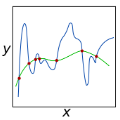Iterative regularization exploits the implicit bias of an optimization algorithm to regularize ill-posed problems. Constructing algorithms with such built-in regularization mechanisms is a classic challenge in inverse problems but also in modern machine learning, where it provides both a new perspective on algorithms analysis, and significant speed-ups compared to explicit regularization. In this work, we propose and study the first iterative regularization procedure able to handle biases described by non smooth and non strongly convex functionals, prominent in low-complexity regularization. Our approach is based on a primal-dual algorithm of which we analyze convergence and stability properties, even in the case where the original problem is unfeasible. The general results are illustrated considering the special case of sparse recovery with the $\ell_1$ penalty. Our theoretical results are complemented by experiments showing the computational benefits of our approach.
翻译:迭代性正规化利用优化算法的隐含偏差来规范不良问题。 以这种内在的正规化机制构建算法是反向问题中的一项典型挑战,但在现代机器学习中也是一项典型挑战,它既提供了算法分析的新视角,也提供了与明确正规化相比的显著加速。 在这项工作中,我们提出并研究第一个迭代性正规化程序,它能够处理非光滑和非强硬化功能所描述的偏见,在低复杂度正规化中占有突出地位。 我们的方法基于原始的双重算法,我们分析其趋同性和稳定性特性,即使在原始问题不可行的情况下也是如此。 总体结果被展示为考虑以$\ell_1美元罚款来稀少复苏的特殊案例。 我们的理论结果得到了实验的补充,展示了我们方法的计算效益。



